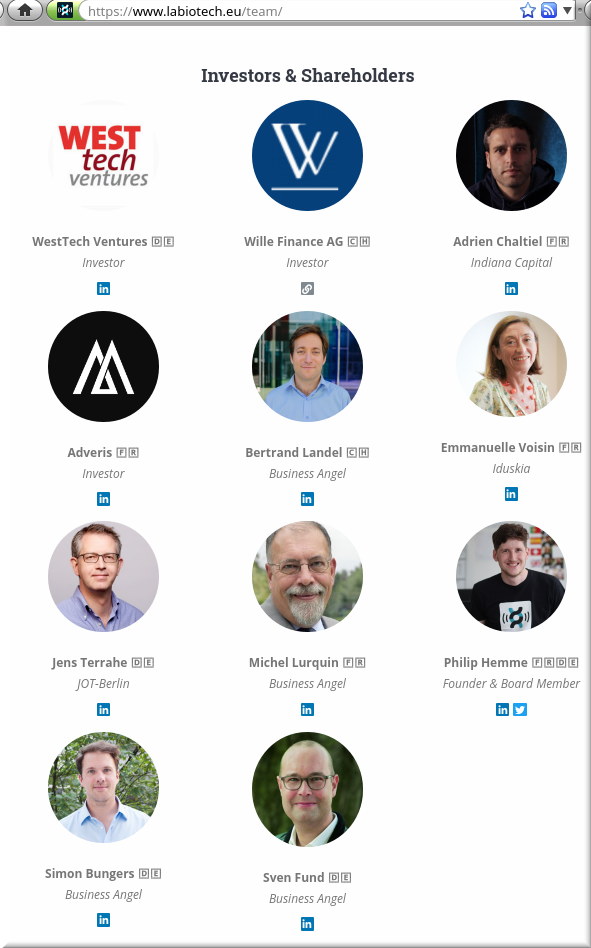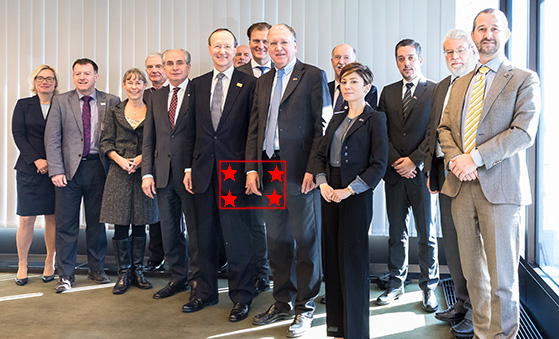

THE SEEMINGLY ENDLESS MEDIA CHEERLEADING for the UPC -- and deliberately false predictions -- have long amused or entertained us. Sure, lies can be rather obnoxious, but we chose to approach it all with humour, including lots of memes and jokes. Team UPC didn't appreciate the funny side of it because its sociopathic members lack a sense of humour and honesty. They see truth-telling as scorn or ridicule.
"Without UK participation the UPC itself is doomed, but never mind those 'pesky' facts."At the end it was, as usual, proven false. The UPC is buried and this new comment has just said: "Brexit is starting to show its effect. And there are still people thinking that UK might be participating in the UPC. Time to give up this dream....."
Without UK participation the UPC itself is doomed, but never mind those 'pesky' facts.
Desperate for a miracle, António Campinos did a photo op earlier this month, akin to this one of Battistelli and CIPA. We reproduce it below.

"Compare it to this month's Campinos photo op, begging for UPC in defiance of constitutions and many other things."It's pretty astounding when one looks for patent news in 2020. There's virtually nothing but press releases and statements by law firms. There's no journalism. Almost none left.
Promoted through Mondaq by John Leeming (J A Kemp LLP, proponents of all the bad things that promote excess litigation and monopolisation) was this piece with overview of software patent cases and related cases, offering tricks for getting software patents in Europe. This is what he wrote about the upcoming T 0489/14, which might as well demonstrate that many if not all software patents granted by the EPO are junk:
2019 has been another busy year for the EPO Boards of Appeal covering computer-implemented inventions, although the most significant case has not reached a conclusion. In T 0489/14 (Pedestrian simulation/CONNOR) of 22.2.2019 questions relating to the patentability of simulations and modelling were referred to the Enlarged Board of Appeal, which has not yet set a timetable for a hearing and decision. Although the questions asked are primarily related to the narrow field of simulation of physical systems, it is possible that the answers given could have a broader impact by affecting what is considered technical.
As has been the case for many years now, the definition of "technical" remains the most significant unanswered question in this field. However, progress has been made, with several decisions developing the approach to separating technical and non-technical features by reference to the "notional business person" first expounded in Cardinal Commerce (T 1463/11) and some other decisions analysing the circumstances in which non-technical features may be considered to contribute to a technical effect.
[...]
This case is discussed in more detail in our briefing here. At the time of writing, a board has been appointed and numerous amicus curiae briefs have been filed, along with invited comments from the President of the EPO. However no timetable for oral proceedings or a decision has been set.
The majority of the amicus curiae briefs and the comments from the President of the EPO are supportive of the existing case law: that simulation or modelling of a specific technical or physical system is patentable, that the simulation has to be based on scientific or technical principles and that the same applies if the simulation is part of a design process. However, there is no guarantee that the Enlarged Board will follow this approach and previous Enlarged Boards have rewritten the questions they have been asked. It is possible therefore that the Enlarged Board will give a decision that has ramifications beyond the field of simulation.
Having said that simulation or modelling of a technical system or process is usually patentable, T 2677/16 (Drug target/QIAGEN) is a case where it was not. In this case, the purpose of the method was "identifying a drug discovery target". A drug target is a molecule in the body, usually a protein or a gene, that is associated with a particular disease process, and could theoretically be targeted by a drug to treat the disease by interrupting the disease-related metabolic pathway. The examining division considered that the potential to produce a therapeutic effect was a sufficient technical purpose but rejected the application for lacking inventive step for not achieving that purpose. The board however held this unduly broadens the concept of a technical purpose to encompass any scientific endeavour in medicine, observing that a "drug target is not a therapy: it has no therapeutic effect, but is merely a promising direction for future research." Thus the invention was considered to be about making discoveries, which are not patentable.
[...]
The EPO recognises the claim categories method, apparatus and product (often created by the method or apparatus) and usually considers a claim to a "system" to be apparatus (hardware). However in T 1499/17 (Pathway recognition/UC) board 3.5.05 observed that 'claims for an "ecosystem" are unheard of. An "ecosystem" neither has an established meaning in the relevant art nor can be construed as an apparatus solely because it has the word "system" as a sub-string.'
In T 1125/17 (Parallelizing computation graphs/AB INITIO) board 3.5.06 commented, obiter, that a "computation graph meant to be executed is, essentially, a computer program." However, the fact that such a graph may be "easier to parallelise" does not provide a "further" technical effect in the absence of a parallel execution platform in the claim. The mere potential for a speed-up by parallelization was not sufficient.
A common issue in some fields of technology is whether a claimed invention provides a technical effect across the entire scope of the claim. This issue rarely arises in the software field but two cases raised similar issues in 2019. T 2223/15 (User-configurable multi-function key entry timeout/Doro) and T 1882/17 (Malware detection/QUALCOMM) refused cases for not demonstrating that a technical effect "is credibly achieved over essentially the whole scope of protection sought".
In T 1164/15 (Printer colorant usage/IPC) the application was rejected because 'the claimed printer controller is defined solely as a "black box" rather than specifying its essential properties for actually finding an optimised trade-off'.
"They don't care what the law actually says, only what their clients want."And speaking of these patently dishonest law firms, watch what the law firm Novagraaf has just published. The piece by Oliver Harris ("Lessons from CRISPR: Getting your European priorities straight") has just been boosted in Lexology -- possibly for a fee -- and the piece is making it sound like a mere formality -- something to be easily overcome by tricks -- was the reason CRISPR patents are rejected. But no, the lesson is that CRISPR patents are junk and worthless, hence should not be pursued anymore.
Harris is not a journalist; his boss is a patent maximalist, so he said: "In a somewhat dramatic twist, the Board of Appeal indicated during the oral proceedings that it might refer the matter of priority to the EPO’s Enlarged Board of Appeal, only to decide a day later that it could deal with that matter without such a referral. Ultimately, the Board re-affirmed the EPO’s ‘all applicants’ approach to valid priority entitlement, whereby all applicants of a priority filing, or their successors in title, must be named as applicants on a later case, for that later case to validly claim priority to the priority filing."
"Nature is simply not an invention."It was not exactly a "dramatic twist" and the reason oppositions succeeded against such patents was their ludicrous nature. Patents ought not be granted on nature. Nature is simply not an invention. Modifying it a little does not make it a human invention, either.
On at least 4 occasions (4 articles) we've taken note/stock of the very poor level/quality of press coverage. It was surreal!
What happened to journalism? Is it unofficially over in 2020?
This morning we saw another example of this trend. A site called Labiotech issued this "press release" (that's how it was labeled!) under its "CRISPR" section to say something (mis)labeled in the headline "Analysis" (spin would be the proper term). To quote:
A decision from the Boards of Appeal at the European Patent Office has revoked the claim of the Broad Institute to general patents on CRISPR/Cas9 gene editing technology, strengthening the position of its opponent UC Berkeley in Europe.
The Broad Institute in Cambridge, US, is one of the main contenders in the ongoing battle for the rights to the intellectual property of CRISPR/Cas9 technology, which is making gene editing easier and faster than ever before. While the Broad Institute has secured CRISPR patents in the US, the European Patent Office (EPO) revoked one of its key patents in 2018.
Now, the Boards of Appeal of the EPO have corroborated this decision. The hearings that took place in Munich last week revolved around the filing date of one of the Broad Institute’s CRISPR patents. The Broad was contending the decision of the EPO that the earlier filing date of a provisional application submitted in the US could not be considered the filing date of its patent application.
"What happened to journalism? Is it unofficially over in 2020?"A pool of fake patents? Like those patents on maths that MPEG-LA uses to blackmail everyone, leveraging these bogus patents in bulk? This way it's virtually impossible to wage a legal challenge. Overall, it became a profitable cartel.
The author, Clara Rodríguez Fernández, works only for this site (as far as one can see) and the site is a German "Trade/B2B" firm. It is more like a business front group than a publisher -- consistent with the pattern we've been noting here for over a week.
"A pool of fake patents? Like those patents on maths that MPEG-LA uses to blackmail everyone, leveraging these bogus patents in bulk? This way it's virtually impossible to wage a legal challenge."Aside from the above we've also found more self-promotional stuff from law firms. Hours ago we found another new example, this time from DLA Piper.
There was also this paid press release about a new patent grant (drowning out any real journalism about the EPO). To quote:
Kitov Pharma Ltd. (“Kitov”) (NASDAQ/TASE: KTOV), a clinical-stage company advancing first-in-class therapies to overcome tumor immune evasion and drug resistance, today announced receipt from the European Patent Office (EPO) of a Notice of Intention to Grant for its patent application entitled “Combinations of IRS/STAT3 Dual Modulators and Anti-Cancer Agents for Treating Cancer.” The patent, which expires in 2036, covers the treatment of NT-219, the company’s novel dual inhibitor of IRS 1/2 and STAT3, in combination with EGFR antibodies and inhibitors.
"The money is in litigation and extortion. This means that patent maximalists run the show."This, believe it or not, pretty much sums up all one can find about the EPO in the news. Still not a single article about the strike vote, not a word about the absurdity of patents on code and nature, not a word about various scandals and blatant corruption of EPO management. Who controls the press? Wrong question. What controls the press? Money. The money is in litigation and extortion. This means that patent maximalists run the show. ⬆